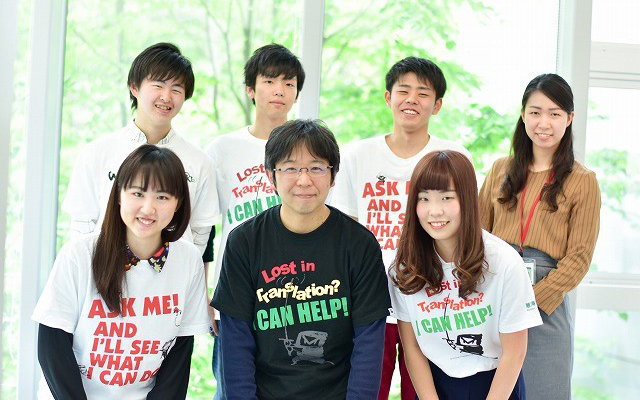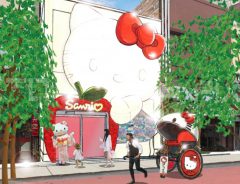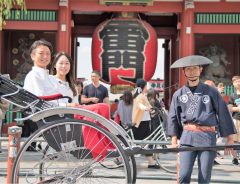
Source: (C) Hospitali-Tee Project
Lost in Translation On Your Tokyo Visit? These Student Volunteers Want To Help!
- Source:
- (C) Hospitali-Tee Project / (C) Hospitali-Tee Project / (C) Toshi Tanaka / (C) Reitaku University
- Tags:
- Asakusa / foreign tourists / foreign visitors / Foreigners / Hospitali-Tee Project / Odaiba / Prof. Tanaka / Reitaku University / Suket Ninja / T-Shirt / Tasuke Jizo / Toshihiro Tanaka / Tourists / Ueno / visitors / volunteers
Related Article
-

All-You-Can-Eat Fall Buffet Is Filled With Fragrant Matsutake Mushroom Dishes and Colorful Regional Vegetables
-

New Asakusa Sanrio Gift Shop to Feature Gigantic Blinking Hello Kitty as Storefront
-

Asakusa rickshaw company offers discounted rides for those who have been vaccinated
-

Creepy Abandoned Underground Train Station in Tokyo Now Open to the Public
-

This Full-Sized Unicorn Gundam Statue Is A Must-See Tokyo Attraction
-

Ride Roller Coasters, Escape Zombies and Manatee-ify Yourself at Japan’s Indoor Amusement Park Joypolis


For first-time visitors and even those who are returning a second and third time, negotiating the streets of Tokyo can be a daunting task. There's no guarantee to find signs in English or other languages, and when everything is unfamiliar, it's very easy to get lost. Of course, there are tourist information centers in major locations and translation apps and devices that can help bridge the language barrier, but sometimes the best and most reassuring assistance is talking to someone who understands you and can lend a helping hand. Trying to approach someone in the streets for directions is one way to do it, but it's going to be hit or miss, since many Japanese people are not confident speaking in English.
Enter the "Hopsitali-Tee Project." The brainchild of Toshihiro Tanaka, Professor of Canadian Studies at the Faculty of Foreign Studies and the Graduate School of Language Education in Reitaku University (Chiba, Japan), the project was created both as a way to give students an opportunity to put their classroom knowledge into a real world situation, thereby giving them confidence and a sense of accomplishment, and as a way to provide assistance to the growing number of foreign tourists visiting their country.
source: (C) Hospitali-Tee
Several times a year, Prof. Tanaka takes groups of students out to major tourist destinations in Tokyo such as Asakusa, Odaiba and Ueno. All participants wear special T-shirts (on sale here) with messages to foreigners announcing their offer of assistance. As you can see on their project page, the T-shirts also feature one of their two mascot characters, Suket Ninja and Tasuke Jizo.
You can see how it works in their promotional video below:
Prof. Tanaka's message to the site's visitors summarizes the spirit of the project:
Most Japanese are shy, and our English is not too impressive. However, plenty of us have the welcoming spirit toward visitors from abroad. People who wear this T-shirt are those willing to lend a helping hand. In other words, it serves as a sign of "hospitality". So we named this "Hospitali-Tee". Anyway, feel free to casually approach and talk to us. Some of us may not speak very well, but we will attempt to help you to the best of our ability. Please experience the many beautiful and interesting places of our country. Our wish is for you to have an enjoyable time. And please, come visit Japan again!
source: (C) Hospitali-Tee
The Hospitality-Tee team will be out again on December 3, from 11:00 AM to 4:30 PM in the Asakusa neighborhood. If you happen to be in Tokyo on that day, you might want to make a point of visiting Asakusa. You may be able to benefit from their assistance!
One of the student volunteers had this to say about their experience in the project:
"Good job!" Those two words make me so happy when I hear them from a visitor. At first, I was anxious about being spoken to in English, but not anymore!
In a press release, Prof. Tanaka explained: "I intend continuing my activities with the objective of sparking a movement across the country where everyone feels naturally inclined to offer assistance to all visitors to Japan."
While official government overtures and commercial efforts to reel in foreign visitors pick up their pace as we head towards 2020, it's good to see student-led projects like this motivated by a genuine spirit of volunteerism and a real desire to make human-to-human connections that can bridge language barriers.